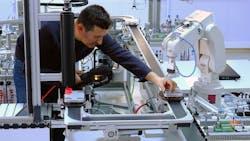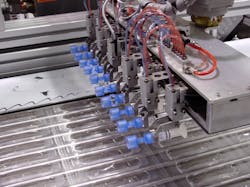Taking the next step in automation: Overcoming the challenges to automate manufacturing
For food processors, the continual need to increase production speed and efficiency while reducing labor has spurred a shift toward implementing automated systems.
However, off-the-shelf equipment will not accommodate every application, particularly those that are complex with robots and conveyors, as well as a host of equipment for manufacturing, packaging, labeling and palletizing that must be flawlessly coordinated. For this reason, even some large automation companies will not take on applications considered too difficult.
In such cases, food processors looking to increase the speed and efficiency of their manufacturing lines need an automation partner that can quickly and cost-effectively deliver tailored, or even custom solutions. This includes the ability to design, build and integrate high-speed, high-volume automated equipment and systems for some of the largest companies in the world, as well as growing corporations seeking to become world-class.
For food industry projects of any size, however, it can be crucial to partner with an expert supplier to overcome a range of obstacles such as meeting specifications and regulatory requirements, system integration and necessary customization, as well as completing the work on time and within budget.
“While implementing off-the-shelf solutions can be a starting point for some food processing projects, automating and incorporating robotics frequently requires a custom solution that meets very specific process requirements. For this reason, even large suppliers in this space will often pass on opportunities if they are not easily resolved,” said Leon Gurevich, founder and chief technology officer of Rapid Development Services (RDS).
RDS is an industrial automation equipment builder, providing design, engineering, integration and fabrication of production machinery. The company has implemented more than 300 complex, robotic manufacturing and assembly projects worldwide, and has been awarded more than 40 patents.
So, at the risk of delay or failure on larger, more complex projects, it is particularly important to work with a supplier that not only has expertise, but also is nimble and flexible.
“When it comes to automating food production, equipment can range from very small to complete lines several hundred feet long that can consist of robots, conveyors, vision systems, server drives, etc.,” said Gurevich, who has worked with companies such as General Mills, Cargill, Anheuser Busch, Johnson and Johnson, Abbott Labs and Pfizer. “So, automation suppliers and integrators need a ‘tool box’ full of solutions including the ability to design and build from scratch in order to fit together all the pieces of the puzzle.”
For the food processing industry, RDS has designed and fabricated high-speed packaging machinery and robotic systems for products such as meat, baking goods, rice and other offerings for human or animal consumption. This has included primary packaging in form-feel-seal, pouch, bag, flow wrap, trays, carton, case and palletizing. Certain systems have included designs for washdowns as well as freezer to high-temperature environments.
For Riviana, the largest supplier of rice in the U.S., the automation equipment builder completed three large packaging projects for two plants. This involved packaging for bags of rice from 2-120 pounds, as well as packing for the rice bags.
Specifically, RDS designed, fabricated and installed a packaging system to pack arrays of bags at up to 100 bags per minute into a container, and then place two of the containers onto a pallet. Another system loaded bags into a sack used for shipping.
“The installation went very well from RDS. The crew was very organized and diligent in their execution of the installation and training,” said Rick Meyer, senior project engineer, Riviana.
In the case of RDS, the company typically uses standardized off-the-shelf solutions and integrates it with other systems, but can design and manufacture equipment and sub-systems for the food industry from scratch, as needed. This includes equipment such as inspection systems, packaging equipment, labeling/marking systems and palletizing automation, as well as filling systems and machine tending automation.
As an example, after trouble with an initial vendor, this approach helped Monsanto Dairy Group stay on schedule with the construction and start-up of a facility in Augusta, Georgia, according to Chris R. Redford, P.E., principal pharmaceutical engineer, Monsanto AG Engineering.
“The custom handling system (originally) purchased by the construction was found unacceptable after a full year of design and fabrication effort. This put us in a very difficult position. We either had to accept a poor-quality piece of equipment — and modify it to meet our requirements, or accept a lengthy schedule delay,” Redford said.
In response, Redford turned to RDS, and credits the company's effort in getting the facility rollout back on track.
According to Redford, in working with RDS, “We were able to design a new handling system from scratch in just a few weeks. (RDS) designed the new system in modular sections that could be brought into the facility through standard door openings. This allowed us to continue facility construction with no delay.”
When automated food manufacturing systems are developed, the equipment must also be robust enough and the integration reliable enough to operate with near flawless capability and minimal supervision for the long haul.
In this regard, a distinct advantage can be gained when working with an integrator that can couple the knowledge of custom machine building with standardized robotics, as well as develop specific control and communication support between production machinery and operator or inventory management systems.
Pohlman, Inc, a Chesterfield, Missouri, manufacturer benefitted from such an approach, according to company president Hank Studt.
“RDS has provided three different automatic robotic pick-and-place machines that have been in use at Pohlman, Inc for over 10 years. The machinery has operated without any service needed by them. This technology helped us to get our products into mass production with a competitive advantage,” said Studt.
So, whether food manufacturers and processors need help automating production, packaging or equipment used in other settings, partnering with an expert in automation can be the surest route to ensuring compliance, reliability and efficiency.
“Companies sometimes shy away from automation when only focusing on direct labor savings or short-term ROI,” said RDS president Sunit Mishra. “However, if you factor in increased production speeds and improved quality along with reduced waste, labor management savings, labor hiring and training savings, as well as repetitive motion injury, the investment in automation usually provides an attractive ROI in the short term. Not to mention, our history shows equipment life spans of well over 20 years, where the ongoing benefits continue to accrue to the bottom line for the life of the equipment.”
Del Williams is a technical writer based in Torrance, California.
Rapid Development Services
About the Author
Del Williams
Del Williams is a technical writer based in Torrance, California.


